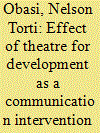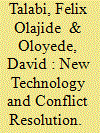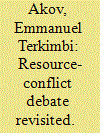| Srl | Item |
| 1 |
ID:
180621


|
|
|
|
|
| Summary/Abstract |
Despite the ongoing conflict between farmers and herdsmen in Nigeria, researchers are yet to substantially focus attention on ways of empowering victims of the conflict through skills acquisition. This study attempts to fill this gap by assessing the effectiveness of theatre for development as a communication intervention strategy for positively influencing the perceptions, knowledge and behavioural intentions related to painting, weaving and fashion and design of victims of the conflict between farmers and herdsmen in Nigeria. A quasi-experiment was utilised with 470 participants. Theatre for development was found to be an effective communication intervention strategy for positively influencing the participants regarding the three arts and crafts examined. The implications of these results for human capital theory and the theory of planned behaviour are explored, and recommendations are made.
|
|
|
|
|
|
|
|
|
|
|
|
|
|
|
|
| 2 |
ID:
161123


|
|
|
|
|
| Summary/Abstract |
This article explores the phenomenon of herdsmen militancy as a new trajectory for the farmer–herder crisis in Nigeria, with reference to its humanitarian implications. Relying on a systematic analysis of secondary data and aligning with the analytical anchorage of liberal political ecology theory, the article posits that herdsmen militancy depicts a contradiction in agrarian relations in the context of a national security crisis which has been complicated by salient socio-ecological factors such as climate change, armed violence, and identity politics. In view of the dire humanitarian consequences of this situation, the article submits that herdsmen militancy constitutes a major threat to human and national security in Nigeria. It makes a case for a pragmatic policy capable of mitigating the myriad socio-ecological factors that tend to trigger herdsmen militancy, with prohibition on open grazing in critical hotbeds of herder–farmer conflict as a strategic measure.
|
|
|
|
|
|
|
|
|
|
|
|
|
|
|
|
| 3 |
ID:
184129


|
|
|
|
|
| Summary/Abstract |
This study tests the effectiveness of a music-based counselling intervention that was digitally recorded on 470 herdsmen in Nigeria. The study was a quasi-experiment with the questionnaire as the instrument for data collection. The result of the study showed that the intervention was effective because respondents in the treatment group scored higher regarding the acceptance of ranching, had more positive intention towards cattle ranching, and more readiness to address challenges that come with cattle ranching than their counterparts in the control group. The researchers highlighted the theoretical and practical implications of the results.
|
|
|
|
|
|
|
|
|
|
|
|
|
|
|
|
| 4 |
ID:
154699


|
|
|
|
|
| Summary/Abstract |
The resource debate is easily discerned as part of the ongoing history of farmer–herdsman conflict in the North Central region of Nigeria. Scarcity theorists are adept at linking scarcity with the onset of livelihood conflict while on the other hand resource abundance pundits insist it is profusion and not scarcity that impels conflict. This article traverses these wrangles and proceeds to downplay the resource polemic altogether. It is proposed that the resource debate, despite its profoundness, presents a narrow reading of farmer–herdsman clashes in Nigeria’s North Central region. It is suggested that a number of other factors, including elite land grabbing, ethno-religious identity construction, weak state capabilities, the citizenship question, corrupt traditional institutions, the lack of an effective land tenure system and a widespread culture of impunity, make for better readings of the conflict. Owing to the negative impacts of the conflict on state and society, it is recommended that the state in Nigeria should commit itself to addressing the citizenship question, strengthening the capabilities of security institutions, extirpating the culture of impunity and revaluing its policy on land redistribution.
|
|
|
|
|
|
|
|
|
|
|
|
|
|
|
|